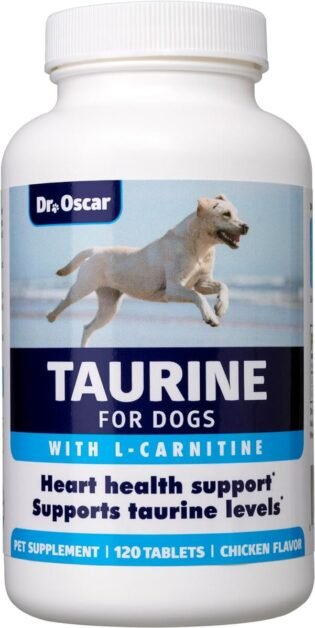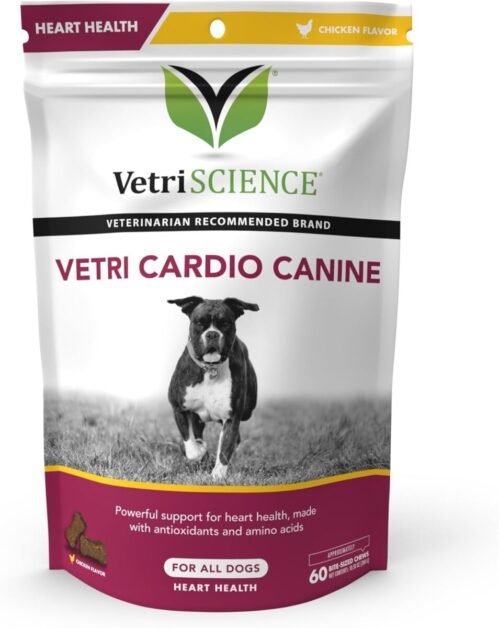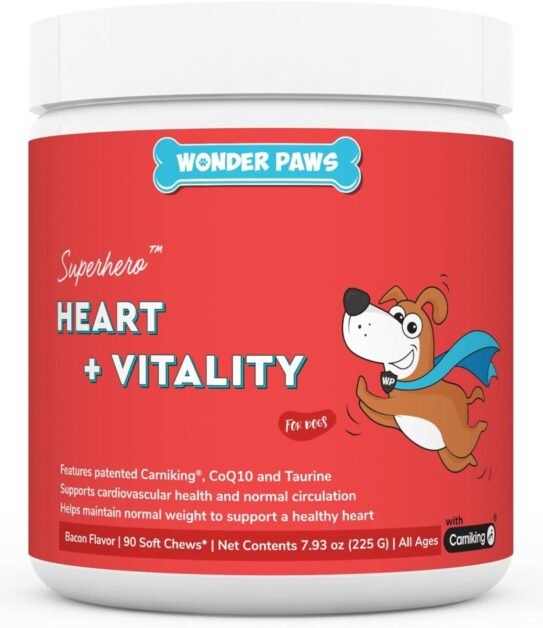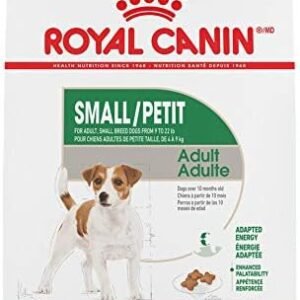In the realm of canine healthcare, a growing spotlight is shining on a remarkable amino acid called Taurine. This vital compound, though lesser-known than some other supplements, plays a crucial role in your dog’s health and well-being. Just like humans, dogs can benefit significantly from taurine, making it an essential topic for any pet owner to explore.
To provide you with accurate and concise information, this article delves into the multifaceted world of taurine for dogs. We will not only discuss the benefits, dosage, and potential side effects of this amino acid but also the crucial importance of consulting with a veterinarian before introducing any new medication or supplement into your dog’s routine.
Taurine at a Glance
Before we embark on this journey, let’s begin with a snapshot of what taurine is and why it’s essential in the realm of canine health.
| Common Names | Taurine |
|---|---|
| Drug Type | Amino Acid |
| Used For | Heart health and eye health. |
| Administered | Tablets, capsules, or as an ingredient in specialized dog food. |
| FDA Approved | At present, taurine itself is not directly regulated by the FDA, but it is an accepted and recognized supplement for dogs. |
Table of Contents

The Significance of Taurine for Dogs
Taurine is an amino acid naturally found in various animal-based proteins. It is not just any amino acid but a crucial one. This remarkable compound is essential for maintaining optimal health in dogs, just as it is in humans.
One of the primary roles of taurine is its involvement in supporting heart health. Taurine contributes to the normal functioning of the heart muscles and helps in maintaining a regular heartbeat. This is especially vital for dogs since many of them are prone to various heart-related conditions.
Taurine also plays a pivotal role in eye health. It is a key component in the retina of the eye, and a deficiency in taurine can lead to severe eye problems in dogs. This is particularly critical for certain breeds, such as American Cocker Spaniels and Golden Retrievers, which are predisposed to retinal issues.
In this article, we’ll explore the myriad benefits that taurine offers to dogs, including its potential to support heart health, eye health, and overall well-being. We’ll also address the dosage recommendations, possible side effects, and the significance of consulting a veterinarian when considering taurine supplementation for your furry friend. With the right information, you can make informed decisions about your dog’s health and ensure they lead a long, healthy, and happy life.
Remember, your dog’s health is paramount, and consulting a veterinarian before introducing any new medication or supplement is a fundamental step in providing the best possible care for your four-legged companion.
II. Understanding Taurine
Taurine, often referred to as an amino acid, is a compound that plays a significant role in maintaining your dog’s overall health and well-being. In this section, we’ll delve deeper into understanding taurine, how it functions within a dog’s body, and the range of conditions and ailments it can help treat or manage.
What is Taurine?
Taurine is a type of amino acid, which are the building blocks of proteins. This particular amino acid is not just vital for dogs but for humans and other animals as well. Taurine is categorized as a semi-essential amino acid because it is synthesized naturally in the body, but in insufficient quantities to meet the metabolic needs, particularly in dogs.
Unlike many other animals, dogs cannot produce taurine in quantities that sufficiently support their health. This is why it’s often necessary to provide taurine through their diet or supplements. It can be obtained from certain foods, most notably meat and animal-based protein sources.
Taurine is notably known for its roles in maintaining cardiac health and supporting the visual system, particularly the retina. Without adequate taurine, dogs can develop heart conditions and vision problems, making it an essential nutrient for their health.
How Does Taurine Work in Dogs’ Bodies?
The mechanisms of taurine in a dog’s body are fascinating and vital. Let’s explore how this amino acid functions to maintain their health.
- Heart Health: Taurine is primarily recognized for its cardiac benefits. It helps regulate and maintain the normal function of the heart muscles. Taurine’s role in the heart involves supporting the contraction and relaxation of the heart muscle cells, ensuring a regular and healthy heartbeat. This is especially crucial because irregular heartbeats can lead to severe health issues, often seen in conditions like dilated cardiomyopathy (DCM).
- Eye Health: Taurine is also essential for the health of a dog’s eyes, specifically the retina. The retina contains photoreceptor cells that capture light and convert it into signals sent to the brain, allowing your dog to see. Taurine is a significant component of these photoreceptor cells and is vital for maintaining their function. A deficiency in taurine can lead to degeneration of the retina and subsequent vision problems, often observed in breeds prone to retinal degeneration.
Common Conditions and Ailments in Dogs that Taurine Can Treat or Manage
Taurine’s therapeutic potential isn’t limited to heart and eye health; it can also play a role in managing or preventing various other conditions in dogs. Some of the common conditions and ailments include:
- Dilated Cardiomyopathy (DCM): As mentioned earlier, taurine is crucial in supporting heart health. In cases of DCM, a dog’s heart becomes enlarged and weakened, leading to insufficient blood pumping and potential heart failure. Taurine supplementation can help manage this condition.
- Retinal Degeneration: Breeds like American Cocker Spaniels and Golden Retrievers are prone to retinal degeneration. Taurine is instrumental in slowing down or preventing the progression of this condition and maintaining vision.
- Obesity: Obesity is a common issue in dogs, and it can lead to various health problems. Taurine may help improve metabolic processes, which, in turn, can aid in weight management.
- Kidney Disease: Some studies suggest that taurine may have a role in supporting kidney health and reducing the risk of certain kidney diseases in dogs.
- Epilepsy: Taurine might help in the management of epilepsy in dogs by stabilizing neural activity.
It’s important to note that while taurine can play a role in managing these conditions, it’s not a standalone solution. Veterinary guidance is crucial in addressing these health issues, and taurine should be used as part of a comprehensive approach to your dog’s well-being.
III. Benefits of Taurine for Dogs
Taurine is a remarkable amino acid with a wide range of benefits for dogs. In this section, we will explore its effectiveness in treating specific canine health issues and how taurine can significantly enhance the quality of life for your furry friend.
Effectiveness in Treating Specific Canine Health Issues
- Cardiac Health: Taurine’s most renowned benefit is its pivotal role in maintaining a dog’s cardiac health. The amino acid directly influences the normal function of the heart muscle, ensuring proper contraction and relaxation. It can help prevent and manage conditions like dilated cardiomyopathy (DCM), which can lead to congestive heart failure. DCM is often seen in certain breeds, and taurine supplementation has been a game-changer in these cases.
- Vision: Taurine is equally vital for your dog’s vision. It plays a crucial role in preserving the health of the retina. For breeds prone to retinal degeneration, taurine can slow down or prevent vision loss. The ability to see and navigate their environment is paramount to a dog’s overall well-being, making this aspect of taurine’s benefits particularly significant.
- Obesity Management: Obesity is a common problem among dogs, which can lead to various health concerns. Taurine can indirectly support weight management. It influences metabolic processes and helps maintain a healthy body weight by optimizing energy expenditure.
- Kidney Health: While not a direct treatment, some studies suggest that taurine may have a role in supporting kidney health and reducing the risk of certain kidney diseases in dogs. It is a testament to the widespread impact of this amino acid on various bodily functions.
- Epilepsy Management: Taurine’s effects on neural activity may help in the management of epilepsy in dogs. While it is not a cure, taurine can contribute to stabilizing neural processes, reducing the frequency and intensity of seizures.
Improving Dogs’ Quality of Life
- Enhanced Energy Levels: Taurine can promote the efficient use of nutrients, aiding in energy production. Dogs receiving an adequate amount of taurine may experience increased vitality and liveliness.
- Improved Heart Function: Dogs with heart conditions like DCM can greatly benefit from taurine supplementation. It not only helps manage the condition but also improves overall heart function, leading to a better quality of life.
- Visual Clarity: For breeds prone to retinal degeneration, taurine can preserve their visual clarity, allowing them to see and interact with their surroundings as they age.
- Weight Maintenance: Taurine contributes to healthy metabolic processes, which can assist dogs in maintaining an ideal body weight. This can prevent obesity-related issues and increase the overall quality of life.
- Epilepsy Control: For dogs with epilepsy, taurine can be part of a comprehensive management plan. Fewer and less severe seizures can significantly improve a dog’s daily life.
- Longevity: The combined effect of taurine on heart health, vision, and overall vitality can extend your dog’s life and improve their golden years.
It’s important to emphasize that taurine is not a universal panacea, and its benefits can vary based on individual needs and conditions. Always consult with your veterinarian to determine the most appropriate use of taurine for your dog. Their expertise will ensure that your furry companion receives the right treatment tailored to their specific health requirements, thereby maximizing the benefits of taurine for their well-being.
IV. Administering Taurine to Dogs
Administering taurine to dogs is a crucial aspect of ensuring they receive the many benefits this amino acid can offer. In this section, we will discuss dosage guidelines, frequency of administration, directions for use, and the importance of adhering to prescribed dosages.
Dosage Guidelines: Determining the Right Dosage for Your Dog’s Size and Condition
Determining the appropriate taurine dosage for your dog is essential to achieve the desired health benefits while avoiding any adverse effects. Dosage guidelines should always be provided by a veterinarian, taking into account your dog’s size, age, and specific health condition.
- Size Matters: The dosage of taurine varies with a dog’s size. Smaller dogs typically require less taurine compared to larger breeds. Your veterinarian will calculate the correct dosage based on your dog’s weight, ensuring that it’s neither excessive nor insufficient.
- Age and Health Condition: Puppies, adult dogs, and senior dogs may have different taurine requirements. Additionally, if your dog has specific health concerns, such as heart issues, retinal degeneration, or epilepsy, the dosage may need to be adjusted to address those conditions.
- Taurine Deficiency: If your dog has been diagnosed with a taurine deficiency or a condition that benefits from taurine supplementation, the dosage will be tailored to address this deficiency effectively.
- Monitoring: It’s crucial to monitor your dog’s response to the taurine dosage. If you notice any unexpected changes, contact your veterinarian promptly. They can make necessary adjustments to the dosage or treatment plan.
Dosage chart of taurine for dogs
Table
| Weight (kg) | Weight (lbs) | Dosage (mg/day) |
|---|---|---|
| 2 – 5 | 4.4 – 11 | 50 – 100 |
| 5 – 10 | 11 – 22 | 100 – 200 |
| 10 – 20 | 22 – 44 | 200 – 400 |
| 20 – 30 | 44 – 66 | 400 – 600 |
| 30 – 40 | 66 – 88 | 600 – 800 |
| 40 – 50 | 88 – 110 | 800 – 1000 |
Frequency of Administration: Daily, Weekly, or as Needed
The frequency of taurine administration depends on your dog’s specific requirements and the form in which taurine is provided.
- Daily Administration: For dogs with chronic conditions or health issues that necessitate taurine supplementation, daily administration is often recommended. This ensures a consistent supply of taurine to address the ongoing health concern.
- Weekly or Periodic Administration: In some cases, especially for preventive purposes or conditions that don’t require daily treatment, taurine can be administered weekly or periodically. This may involve a higher dose given less frequently.
- As Needed: Some dogs may only require taurine supplementation as needed. For instance, during stressful situations or as a part of a specific treatment plan. Always follow your veterinarian’s guidance on when and how to administer taurine.
Directions for Use: Tips for Administering Taurine to Dogs
Administering taurine to your dog can be straightforward with the right approach. Here are some tips for ensuring your dog receives their taurine supplement with ease:
- Consult Your Veterinarian: Before starting any taurine supplementation, consult your veterinarian to ensure you have the right product and dosage. They can also guide you on the best method of administration.
- Choose the Right Form: Taurine supplements come in various forms, including capsules, liquid, or powder. Your veterinarian will recommend the most suitable form for your dog based on their preferences and health condition.
- Mix with Food: Many dogs readily accept taurine when it’s mixed with their regular food. Ensure thorough mixing to prevent your dog from picking around the supplement.
- Hide in Treats: If your dog is finicky about supplements, you can hide the taurine in a treat or a small amount of a favorite food. Be sure they consume the entire treat to receive the full dose.
- Crushing Capsules: If your dog refuses to swallow capsules, you can ask your veterinarian if it’s acceptable to crush them and mix the taurine powder with food.
- Follow Dosage Instructions: Always follow your veterinarian’s recommended dosage instructions to ensure your dog receives the correct amount. Do not alter the dosage without consulting them.
Importance of Adhering to Prescribed Dosages: Missed Dose Guideline
Adhering to the prescribed taurine dosage is crucial for your dog’s well-being and the effectiveness of the treatment. Missing doses or altering the dosage without veterinary guidance can lead to suboptimal results or even negative outcomes.
- Consistency is Key: Taurine works most effectively when it’s consistently administered according to your veterinarian’s recommendations. Missing doses can disrupt the desired effects.
- Underdosing vs. Overdosing: Underdosing won’t provide the intended benefits, while overdosing can lead to adverse effects. It’s imperative to maintain the prescribed dosage.
- Consult Your Vet for Missed Doses: If you accidentally miss a dose, contact your veterinarian for guidance. They can advise on whether to administer the missed dose or wait until the next scheduled dose.
- Never Double-Dose: Do not double the dose to compensate for a missed one without your veterinarian’s approval. This can result in unwanted side effects or overdose.
Remember that taurine supplementation should always be part of a broader treatment plan guided by your veterinarian. Regular check-ups and discussions with your vet are essential to monitor your dog’s response to taurine and make any necessary adjustments. By adhering to prescribed dosages and guidelines, you can help ensure your dog receives the maximum benefit from taurine while keeping them in the best possible health.
V. Taurine Supplements for dogs
Best Taurine Supplements for Dogs: Ensuring Optimal Health
Signs of Taurine Deficiency
Taurine deficiency can lead to serious health issues in dogs, such as:
- Dilated Cardiomyopathy (DCM): A condition where the heart becomes enlarged and weakened.
- Retinal Degeneration: Leading to vision loss.
- Immune System Compromise: Making dogs more susceptible to infections.
Certain breeds, such as Golden Retrievers, American Cocker Spaniels, and Newfoundlands, are more prone to taurine deficiency and may benefit from supplementation.
Top Taurine Supplements for Dogs
Here are some of the best taurine supplements available for dogs:
- VetriScience Laboratories Cardio Strength
- Description: This supplement is designed to support cardiovascular health in dogs. It contains a blend of taurine, L-carnitine, and other heart-supporting nutrients.
- Benefits: Helps improve heart function and overall cardiovascular health.
- Dosage: Follow the veterinarian’s recommendation based on your dog’s weight and health condition.
- Dr. Oscar Taurine Supplement for Dogs
- Description: Dr. Oscar’s taurine supplement includes 500 mg of taurine per tablet, along with L-carnitine for added heart health benefits.
- Benefits: Supports heart health, improves energy levels, and enhances overall well-being.
- Dosage: Typically one tablet per day, but consult your vet for specific dosage instructions.
- Wonder Paws Cardio Support for Dogs
- Description: This supplement combines taurine with CoQ10 and L-carnitine to provide comprehensive heart support.
- Benefits: Enhances heart function, supports energy production, and promotes healthy aging.
- Dosage: Follow the product label or your veterinarian’s advice.
- InClover BioVibrant Dog Heart Health Supplement
- Description: InClover BioVibrant is formulated with taurine, L-carnitine, and other heart-healthy ingredients to support cardiovascular health.
- Benefits: Improves heart function, supports healthy blood flow, and boosts overall vitality.
- Dosage: Administer as directed by your veterinarian.
- Stella & Chewy’s Stella’s Solutions
- Description: This supplement includes taurine along with other essential nutrients to support heart health and overall well-being.
- Benefits: Promotes heart health, enhances energy levels, and supports a healthy immune system.
- Dosage: Follow the product instructions or consult your vet.
Top 10 Foods Highest in Taurine for Dogs
Ensuring your dog gets enough taurine is essential for their heart and eye health. While taurine supplements are available, incorporating natural sources of taurine into your dog’s diet can be highly beneficial. Here are the top 10 foods that are rich in taurine and can help maintain your dog’s health:
- Dark Meat Poultry (Chicken and Turkey)
- Description: Dark meat, such as thighs and drumsticks, is rich in taurine.
- Benefits: Provides essential amino acids and supports muscle development.
- Fish (Salmon, Tuna, and Sardines)
- Description: Fish is an excellent source of taurine, especially fatty fish like salmon and tuna.
- Benefits: Rich in omega-3 fatty acids, which support heart and brain health.
- Beef
- Description: Beef, particularly organ meats like liver and heart, is high in taurine.
- Benefits: Provides high-quality protein and essential vitamins.
- Lamb (Dark Meat)
- Description: Lamb, especially the dark meat, is another good source of taurine.
- Benefits: Rich in protein and essential nutrients.
- Pork (Loin and Picnic Ham)
- Description: Pork, particularly the loin and picnic ham, contains significant amounts of taurine.
- Benefits: Provides a good balance of protein and fat.
- Organ Meats (Liver and Heart)
- Description: Organ meats are among the richest sources of taurine.
- Benefits: Packed with essential vitamins and minerals.
- Eggs
- Description: Eggs are a versatile and taurine-rich food.
- Benefits: High in protein and essential nutrients.
- Raw Goat’s Milk / Kefir
- Description: Raw goat’s milk and kefir are excellent sources of taurine.
- Benefits: Supports digestive health and provides probiotics.
- White Fish
- Description: White fish, such as cod and haddock, also contain taurine.
- Benefits: Low in fat and high in protein.
- Shellfish (Clams and Mussels)
- Description: Shellfish like clams and mussels are rich in taurine.
- Benefits: Provide essential minerals and are low in fat.
Incorporating these taurine-rich foods into your dog’s diet can help ensure they receive adequate amounts of this essential amino acid. Always consult with your veterinarian before making significant changes to your dog’s diet, especially if they have specific health conditions or dietary needs.
Choosing the Right Taurine Supplement
When selecting a taurine supplement for your dog, consider the following factors:
- Quality: Choose supplements from reputable brands that use high-quality ingredients.
- Form: Taurine supplements are available in various forms, including tablets, capsules, and powders. Select the form that is easiest for you to administer to your dog.
- Dosage: Ensure the supplement provides the appropriate dosage for your dog’s weight and health condition. Consult your veterinarian for specific recommendations.
- Additional Ingredients: Some supplements include additional ingredients like L-carnitine, CoQ10, and vitamins that provide extra health benefits.
Conclusion
Taurine is a vital nutrient for maintaining your dog’s heart and eye health. While many dogs can synthesize taurine from their diet, some breeds and individuals may require supplementation to prevent deficiencies. Choosing the right taurine supplement involves considering the quality, form, dosage, and additional ingredients. Always consult your veterinarian before starting any new supplement regimen to ensure it is safe and effective for your dog.
VI. Potential Side Effects and Precautions
As with any supplement or medication, it’s crucial to be aware of potential side effects and take necessary precautions when administering taurine to your dog. This section will delve into common side effects, identifying severe or adverse reactions, precautions for pregnant or lactating dogs, and interactions with other medications or supplements.
Common Side Effects of Taurine in Dogs
Taurine is generally well-tolerated by dogs, and adverse reactions are relatively rare. However, some common side effects may occur, although they are typically mild and transient:
- Gastrointestinal Upset: Dogs may experience mild gastrointestinal symptoms, such as diarrhea or loose stools when starting taurine supplementation. These symptoms often resolve as the dog’s system adjusts to the supplement.
- Excessive Thirst and Urination: Some dogs may temporarily drink more water or urinate more frequently when first taking taurine. This is usually not a cause for concern, but any sudden, excessive change in drinking and urination should be reported to your veterinarian.
- Allergic Reactions: Although rare, some dogs may exhibit mild allergic reactions, such as itching, hives, or facial swelling. If you notice any of these symptoms, discontinue taurine and consult your veterinarian.
Identifying Severe or Adverse Reactions
While severe adverse reactions to taurine are extremely uncommon, it’s essential to be vigilant for any signs of distress in your dog:
- Allergic Reactions: If your dog experiences severe allergic reactions, such as difficulty breathing, pronounced swelling, or severe itching, this is a medical emergency. Seek immediate veterinary attention.
- Vomiting and Diarrhea: Continuous vomiting, severe diarrhea, or bloody stools are cause for concern. Contact your veterinarian promptly if these symptoms persist.
- Lethargy or Weakness: If your dog becomes unusually lethargic, weak, or unresponsive, it may be related to taurine supplementation. Consult your veterinarian right away.
- Difficulty Breathing or Collapse: Any signs of respiratory distress or collapse should be treated as a medical emergency. Notify your veterinarian immediately.
It’s important to remember that while these symptoms are listed as potential adverse reactions, they are highly unusual with taurine supplementation. Most dogs tolerate taurine well, but it’s crucial to remain watchful, especially when introducing any new supplement.
Precautions for Pregnant or Lactating Dogs
If your dog is pregnant or lactating, there are specific precautions to consider when administering taurine:
- Consult Your Veterinarian: Before giving taurine to a pregnant or lactating dog, consult your veterinarian. They can provide guidance on whether taurine supplementation is necessary and what dosages are safe.
- Benefit vs. Risk: Taurine supplementation during pregnancy or lactation may be recommended in cases of deficiency or specific health issues. Your veterinarian can assess the potential benefits and weigh them against any possible risks.
- Ensure a Balanced Diet: Pregnant and lactating dogs require a well-balanced diet tosupport their increased nutritional needs. Taurine is often obtained through diet, so providing high-quality, nutritionally complete food is essential.
- Monitor for Allergic Reactions: Pregnant or lactating dogs may be more susceptible to allergic reactions. Monitor for any signs of allergic symptoms and contact your veterinarian if they occur.
Interactions with Other Medications or Supplements
Before giving taurine to your dog, consider any potential interactions with other medications or supplements they are currently taking. It’s crucial to:
- Inform Your Veterinarian: Make sure your veterinarian is aware of all the medications, supplements, and treatments your dog is receiving. This includes any over-the-counter medications or herbal supplements.
- Discuss Potential Interactions: Your veterinarian can assess potential interactions between taurine and other substances your dog is exposed to. They will provide guidance on how to safely incorporate taurine into the treatment plan.
- Monitor Your Dog’s Response: Keep a close eye on your dog’s response to taurine, especially if they are taking other medications. Any unexpected changes in behavior or health should be reported to your veterinarian.
While taurine is generally well-tolerated and has minimal interactions with other substances, it’s always best to be cautious and consult your veterinarian to ensure the safety and effectiveness of taurine supplementation for your dog. By being aware of potential side effects, promptly identifying severe reactions, taking precautions for pregnant or lactating dogs, and discussing interactions with your vet, you can provide your dog with the benefits of taurine while minimizing risks.
VII. Consultation with a Veterinarian
In this section, we’ll emphasize the critical importance of seeking professional guidance when considering taurine supplementation for your dog. We’ll discuss the potential for overdose, signs or symptoms that should prompt you to call the vet, and how to discuss taurine with your veterinarian, including the option of seeking a second opinion if needed.
The Importance of Professional Guidance
One of the cornerstones of responsible pet ownership is recognizing when to rely on the expertise of a veterinarian. This holds true when considering taurine supplementation for your dog. While taurine is generally safe, and many dogs can benefit from it, there are various factors to consider. These factors include your dog’s individual health, dietary needs, and the proper dosage to achieve the desired results without adverse effects.
Your veterinarian is your trusted partner in ensuring your dog’s well-being. Here’s why their guidance is crucial:
- Tailored Recommendations: Veterinarians can evaluate your dog’s specific health conditions and dietary requirements. They can provide personalized recommendations regarding taurine dosage and administration.
- Balanced Approach: Your vet can help you incorporate taurine into your dog’s overall diet and care plan. This ensures that taurine supplementation complements other treatments and dietary considerations.
- Monitoring for Side Effects: While taurine is generally safe, it’s essential to monitor your dog for any potential side effects. Veterinarians can guide you on what to watch for and provide guidance if any adverse effects occur.
- Consideration of Existing Medications: If your dog is already taking medications or supplements, your veterinarian can assess how taurine interacts with these substances, ensuring there are no adverse effects or interactions.
- Professional Guidance on Dosage: Dosage recommendations can vary based on a dog’s size, breed, and individual health. Veterinarians can help you determine the appropriate dosage for your dog’s specific needs.
Overdose Information and Possible Toxicity
While taurine is considered safe, like any supplement, there’s the potential for overdose. Although taurine toxicity is rare, it’s vital to be aware of the signs and symptoms, which will be discussed later in this section.
Overdosing on taurine can lead to gastrointestinal upset, including symptoms like diarrhea, vomiting, or excessive thirst and urination. If you suspect an overdose, contact your veterinarian immediately. They can advise you on steps to take, which may include discontinuing taurine supplementation and monitoring your dog’s condition.
Signs or Symptoms: When to Call the Vet
Recognizing the signs or symptoms that may indicate a problem with taurine supplementation is vital for your dog’s well-being. While these symptoms are uncommon, it’s essential to be vigilant. If you notice any of the following signs or symptoms, contact your veterinarian promptly:
- Allergic Reactions: Signs of an allergic reaction can include itching, hives, facial swelling, or difficulty breathing. Allergic reactions are rare but require immediate veterinary attention.
- Persistent Gastrointestinal Upset: If your dog experiences ongoing, severe gastrointestinal symptoms like vomiting, diarrhea, or bloody stools, it’s crucial to consult your veterinarian.
- Lethargy and Weakness: Unusual lethargy, weakness, or a general lack of energy can indicate a problem. Your veterinarian should evaluate these symptoms.
- Respiratory Distress: Any difficulty breathing or respiratory distress is a medical emergency. Seek immediate veterinary care.
While the likelihood of these symptoms occurring is low, prompt action is essential if they do. Your veterinarian can assess the situation, provide treatment, and ensure the safety and well-being of your dog.
How to Discuss Taurine with Your Veterinarian
Open communication with your veterinarian is key to making informed decisions about your dog’s health. Here’s how to discuss taurine with your vet:
- Provide a Complete Health History: Share your dog’s complete health history with your veterinarian. This includes any underlying health conditions, allergies, or medications your dog may be taking.
- Ask Questions: Don’t hesitate to ask questions about taurine and its potential benefits for your dog. Your vet can provide detailed information to address your concerns.
- Review Dosage Recommendations: If your vet recommends taurine supplementation, discuss the dosage and administration guidelines. Ensure you fully understand how to provide taurine to your dog.
- Express Concerns: If you have any concerns about taurine supplementation or potential side effects, share them with your veterinarian. They can address your worries and provide reassurance.
- Seek a Second Opinion (If Needed): If you have reservations or uncertainties, don’t hesitate to seek a second opinion from another qualified veterinarian. Your dog’s health and well-being are paramount, and a second opinion can provide added confidence in your decision.
In summary, your veterinarian is your most valuable resource when it comes to considering taurine supplementation for your dog. Their expertise, guidance, and personalized recommendations are essential to ensure your dog receives the best possible care. By maintaining open communication and seeking professional advice, you can make informed decisions that promote your dog’s health and quality of life.
VIII. Comparison with Similar Drugs in this Category
In this section, we’ll delve into the world of taurine supplements for dogs and compare them with similar drugs in the same category. We’ll discuss the efficacy of these drugs, considerations when choosing one over another, and the cost implications.
Comparing the Efficacy of Drugs
When it comes to addressing taurine deficiency or related health issues in dogs, various options are available. These options include not only taurine supplements but also alternative drugs and therapies. Let’s compare the efficacy of taurine supplementation with these alternatives:
- Taurine Supplements: Taurine supplements are known to be effective in cases where taurine deficiency is identified as a contributing factor to specific health issues. This naturally occurring amino acid can help address cardiac and eye conditions associated with taurine deficiency, potentially improving your dog’s overall health and well-being.
- Prescription Medications: In cases where taurine deficiency is causing severe health issues, such as dilated cardiomyopathy (DCM), veterinarians may prescribe specific medications to address heart-related problems. While these medications can be beneficial, taurine supplementation may also be recommended in conjunction with prescription drugs.
- Nutritional Changes: Altering your dog’s diet to include taurine-rich foods is an option for addressing taurine deficiency. Nutritional changes can be effective if your dog’s taurine deficiency is primarily diet-related. However, the speed and extent of improvement may vary.
- Additional Supplements: In some cases, veterinarians may recommend additional supplements along with taurine. These can include L-carnitine, omega-3 fatty acids, and coenzyme Q10, which may have synergistic effects when used alongside taurine supplementation.
The choice of treatment depends on the specific health issue your dog is facing and the underlying causes of taurine deficiency. Your veterinarian will determine the most appropriate approach based on your dog’s individual needs.
Comparing Which Alternative Is Chosen When
Determining which alternative to choose often depends on the diagnosis and the veterinarian’s recommendations. Here’s a breakdown of when each alternative might be chosen:
- Taurine Supplements: Taurine supplementation is typically chosen when your dog is diagnosed with a taurine deficiency, and this deficiency is contributing to health issues. It’s a safe and effective option for addressing taurine-related conditions like DCM and certain eye problems.
- Prescription Medications: Prescription medications are more commonly recommended when your dog is dealing with advanced stages of conditions like DCM. These medications may be used alongside taurine supplements for comprehensive treatment.
- Nutritional Changes: Adjusting your dog’s diet to include taurine-rich foods is often considered when taurine deficiency is believed to be primarily diet-related. This option can be beneficial for addressing taurine deficiency early on and preventing further issues.
- Additional Supplements: Some health conditions may benefit from a combination of supplements, including taurine, L-carnitine, omega-3 fatty acids, and coenzyme Q10. This approach is chosen when the veterinarian believes that multiple supplements may work synergistically to address the specific condition.
Your veterinarian will guide you in choosing the right alternative based on your dog’s condition, medical history, and individual requirements.
Comparing the Cost of the Drug
The cost of the chosen treatment can be a significant factor in your decision-making process. Let’s examine the cost considerations of these alternatives:
- Taurine Supplements: Taurine supplements are generally cost-effective. They are available in various forms, including capsules, chewable tablets, and powder, which allows you to select a product that fits your budget.
- Prescription Medications: Prescription medications may be more expensive, depending on the specific drug prescribed. These costs can add up over time, particularly if your dog requires ongoing medication.
- Nutritional Changes: Adjusting your dog’s diet to include taurine-rich foods may result in increased food expenses. The extent of the cost increase depends on the type and quantity of taurine-rich foods you choose.
- Additional Supplements: When multiple supplements are recommended, the combined cost can be higher than using taurine alone. However, the improved efficacy may justify the investment.
The cost should be considered alongside the efficacy and individual needs of your dog. Discuss the financial aspects of treatment with your veterinarian to ensure that you make an informed choice that aligns with your budget.
In conclusion, taurine supplementation is a valuable option for addressing taurine deficiency-related health issues in dogs. However, it’s essential to work closely with your veterinarian to determine the most appropriate course of action, whether that’s taurine supplements, prescription medications, dietary changes, or a combination of treatments. Your dog’s health and well-being are paramount, and the choice should be based on their specific needs and circumstances.
IX. Frequently Asked Questions (FAQs)
1. What is taurine, and why is it essential for dogs?
Taurine is an amino acid that plays a vital role in various biological processes in dogs. It’s essential for heart health, eye health, and overall well-being. Taurine helps maintain proper muscle function and supports the function of cells throughout the body.
2. How do I know if my dog needs taurine supplementation?
Your veterinarian will determine if your dog requires taurine supplementation. They may recommend taurine supplementation if your dog is diagnosed with taurine deficiency or if they have certain health conditions associated with taurine deficiency, such as dilated cardiomyopathy (DCM) or certain eye problems.
3. What are the signs of taurine deficiency in dogs?
The signs of taurine deficiency can vary but may include weakness, lethargy, loss of appetite, weight loss, and cardiac issues. In cases of taurine-related DCM, symptoms may include coughing, difficulty breathing, and exercise intolerance. If you notice any of these signs, consult your veterinarian.
4. Can I give my dog taurine supplements without a veterinarian’s recommendation?
It’s essential to consult your veterinarian before giving your dog any supplements, including taurine. While taurine is generally safe, the correct dosage and duration of supplementation should be determined by a veterinarian to ensure your dog’s specific needs are met.
5. What are the different forms of taurine supplements for dogs?
Taurine supplements for dogs are available in various forms, including capsules, chewable tablets, and powdered formulations. The choice of form may depend on your dog’s preferences and your veterinarian’s recommendations.
6. Are there specific dog breeds more prone to taurine deficiency?
Some dog breeds are more predisposed to taurine deficiency and related conditions, including DCM. Breeds that have a higher risk of taurine-related issues include Golden Retrievers, Cocker Spaniels, and some large and giant breeds.
7. Can my dog get enough taurine from their diet alone?
In many cases, dogs can obtain sufficient taurine from their diet. Commercial dog foods are often formulated to meet the nutritional needs of most dogs. However, certain health conditions or dietary factors can lead to taurine deficiency, making supplementation necessary.
8. Can taurine supplements interact with other medications my dog is taking?
Taurine supplements are generally safe and have a low risk of interacting with other medications. However, it’s crucial to inform your veterinarian about all the medications and supplements your dog is taking to ensure there are no potential interactions.
9. How long does it take to see the effects of taurine supplementation in my dog?
The time it takes to see the effects of taurine supplementation can vary depending on your dog’s condition. In some cases, improvements may be observed within weeks, while in others, it may take several months. Your veterinarian will monitor your dog’s progress and adjust the treatment plan as needed.
10. Is taurine safe for long-term use in dogs?
Taurine is generally safe for long-term use in dogs when administered under the guidance of a veterinarian. Your veterinarian will determine the appropriate duration of supplementation based on your dog’s specific health needs.
11. Are there any side effects associated with taurine supplementation in dogs?
Taurine supplementation is considered safe and is associated with very few side effects. Some dogs may experience mild gastrointestinal upset, but this is rare. It’s crucial to follow your veterinarian’s dosing instructions to minimize any potential side effects.
12. Can I purchase taurine supplements over the counter, or do I need a prescription?
Taurine supplements for dogs are typically available over the counter and do not require a prescription. However, it’s advisable to consult your veterinarian before starting any supplementation regimen to ensure it’s appropriate for your dog.
In conclusion, taurine is a vital amino acid for your dog’s health, and its supplementation can be a crucial part of managing specific health conditions. Always seek the guidance of your veterinarian to determine whether taurine supplementation is necessary and to establish the correct dosage and duration of use for your beloved canine companion.






















